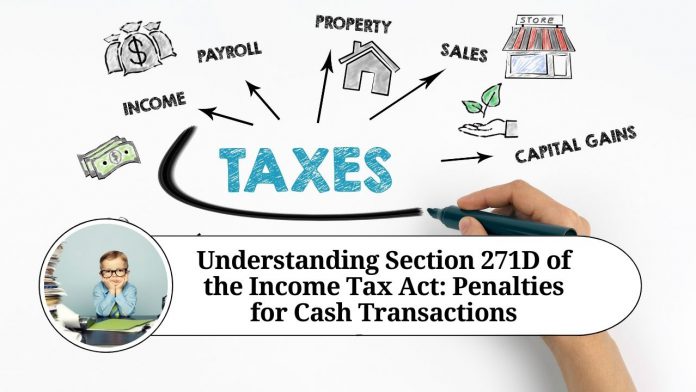Section 271D of the Income Tax Act is a provision that imposes penalties for cash transactions that exceed certain thresholds. This section aims to promote digital transactions and curb the circulation of black money in the economy. In this blog, we will take a closer look at this provision and understand its implications.
What is Section 271D?
Section 271D of the Income Tax Act, 1961, states that any person who receives an amount of Rs. 20,000 or more in cash, in a single day or in relation to a single transaction or an event, cannot accept the payment. This means that any payment that exceeds Rs. 20,000 must be made through electronic modes such as bank transfers, cheques, or credit/debit cards.
Penalties for Violation
If a person violates Section 271D, he/she is liable to pay a penalty equal to the amount of cash received. For instance, if a person receives Rs. 30,000 in cash, he/she is liable to pay a penalty of Rs. 30,000. The penalty will be in addition to any tax that may be payable on the income.
Exceptions to Section 271D
There are a few exceptions to Section 271D. For example, the provision does not apply to the government, any banking company, post office savings bank, or co-operative bank. Similarly, payments made to certain entities such as hospitals, educational institutions, and government agencies are also exempted from this provision.
The provision also allows for some exemptions in certain circumstances, such as when a person receives cash as a gift, or in the event of an unforeseen emergency. However, such exemptions are granted on a case-to-case basis and are subject to the discretion of the Income Tax Officer.
Why was Section 271D Introduced?
The introduction of Section 271D was aimed at curbing the circulation of black money in the economy. Cash transactions are often used to evade taxes, as they can be conducted without leaving a paper trail. By imposing penalties on cash transactions exceeding Rs. 20,000, the government hopes to promote digital transactions and increase transparency in financial transactions.
In conclusion
Section 271D of the Income Tax Act is an important provision aimed at promoting digital transactions and curbing the circulation of black money in the economy. It imposes penalties on cash transactions exceeding Rs. 20,000, and any violators are liable to pay a penalty equal to the amount of cash received. While there are some exceptions to this provision, it is important for individuals and businesses to be aware of its implications to avoid any penalties or legal repercussions.
Read more useful content:
- section 234e of income tax act
- section 286 of income tax act
- section 90a of income tax act
- section 40a(7) of income tax act
- section 226(3) of income tax act
- section 24 of income tax act
Frequently Asked Questions (FAQs)
Q. What is Section 271D of the Income Tax Act?
Section 271D of the Income Tax Act is a provision that imposes penalties on cash transactions exceeding Rs. 20,000 in a single day or in relation to a single transaction or event.
Q. What is the penalty for violating Section 271D?
If a person violates Section 271D, he/she is liable to pay a penalty equal to the amount of cash received. For example, if a person receives Rs. 30,000 in cash, he/she is liable to pay a penalty of Rs. 30,000.
Q. Who is liable to pay the penalty for violating Section 271D?
The person who receives the cash payment is liable to pay the penalty for violating Section 271D.
Q. Are there any exceptions to Section 271D?
Yes, there are some exceptions to Section 271D. For example, the provision does not apply to the government, any banking company, post office savings bank, or co-operative bank. Similarly, payments made to certain entities such as hospitals, educational institutions, and government agencies are also exempted from this provision.
Q. What is the purpose of Section 271D?
The purpose of Section 271D is to promote digital transactions and curb the circulation of black money in the economy.
Q. Can a person receive cash payment exceeding Rs. 20,000 in a day from the same person in multiple transactions?
No, a person cannot receive cash payment exceeding Rs. 20,000 in a day from the same person in multiple transactions. Such transactions will be considered as a single transaction for the purpose of Section 271D.




















